| Srl | Item |
| 1 |
ID:
096834
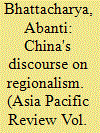

|
|
|
| 2 |
ID:
081427
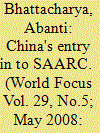

|
|
|
| 3 |
ID:
069149
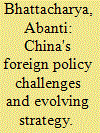

|
|
|
| 4 |
ID:
079467
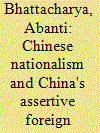

|
|
|
| 5 |
ID:
078669
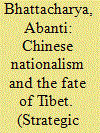

|
|
|
|
|
| Publication |
2007.
|
| Summary/Abstract |
Chinese nationalism primarily represents Han nationalism and ignores ethnic minority sub-nationalisms and identities in the larger cause of the state's unity and integrity. The Chinese state calls for submerging of all minority identities within the predominant Han identity, for promoting national cohesion and nationalism, effectively precluding the possibility of the assertion of Tibetan nationalism and autonomy. Because of the suppression of Tibetans in China, a large number of them have fled and settled in India and elsewhere. The Tibetan movement for safeguarding their identity, culture and political space has grievously suffered as a result of Chinese nationalism and China's Tibet policy. The fate of Tibetan nationalism is, to a large extent, tied to the dynamics of the Sino-Indian relations and the course of the internal Tibetan politics and that of its relationship with the community in exile in the post-Dalai Lama era.
|
|
|
|
|
|
|
|
|
|
|
|
|
|
|
|
| 6 |
ID:
066888
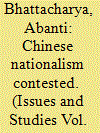

|
|
|
| 7 |
ID:
167317
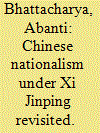

|
|
|
|
|
| Summary/Abstract |
In China, nationalism that took root in the era of globalization under the third-generation leadership of Jiang Zemin is principally meant to address the internal threats challenging party legitimacy and stability and not to resist the foreign enemies, as was the goal in the twentieth century. This is because internal stability is considered prerequisite to harness the potentials of globalization. Paradoxically therefore, nationalism and globalization, that are antithetical forces, go hand in hand in China. Under the current leadership, both the forces of nationalism and globalization are underscored in Xi Jinping’s dream project- the Belt and Road Initiative (BRI). Notably, the success of BRI is contingent on the persistence of globalization externally. But the rising trends of de-globalization in the West do not augur well for the BRI that has been envisaged to not only meet the demands of a slowing economy but to expand China’s global footprints, and thereby, fulfil the China Dream. Therefore, a sense of insecurity pervades Chinese nationalism. This ‘insecure’ nationalism under Xi Jinping is engendering a belligerent turn to Chinese foreign policy.
|
|
|
|
|
|
|
|
|
|
|
|
|
|
|
|
| 8 |
ID:
078008
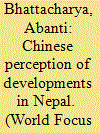

|
|
|
| 9 |
ID:
123315


|
|
|
|
|
| Publication |
2013.
|
| Summary/Abstract |
Integrating the restive Tibetan minority with China has been the primary domestic challenge for Beijing. Thus far, its Nepal policy has been crafted essentially to address the Tibetan question. The idea of trilateral cooperation between India, Nepal and China apparently floated by Pushpa Kamal Dahal (Prachanda) in April 2013 was, in effect, first made by the former Chinese ambassador to Nepal, Yang Houlan, in 2012. Calling Kathmandu a trade gateway to New Delhi, he said: 'From an economic viewpoint, Nepal links China (with 1.3 billion people) with South Asia (with 1.5 billion people) the huge common market (that) provides great opportunities for both China and South Asia'.
|
|
|
|
|
|
|
|
|
|
|
|
|
|
|
|
| 10 |
ID:
056507
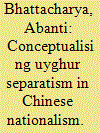

|
|
|
| 11 |
ID:
149645
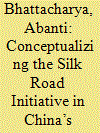

|
|
|
|
|
| Summary/Abstract |
While the Silk Route Initiative (SRI) appears to be a novel foreign policy strategy under Xi Jinping’s leadership, it is integral to China’s periphery policy (zhoubian zhengce). Arguably, periphery policy is rooted in the Chinese imperial history and has remained a salient aspect of state formation and foreign policymaking of the post-1949 China. Under Xi Jinping, it has acquired a preeminent foreign policy goal. This study puts the SRI in a historical framework and argues for the centrality of periphery in China’s domestic and foreign policy. Looking at the SRI from the prism of periphery, while suggesting an essential continuity in Chinese foreign policy and strategic thinking, also indicates that periphery is not simply a frontier strategy. Rather, it encompasses the whole gamut of Chinese domestic and foreign policy. Embedded thus in the periphery policy, the SRI is a well thought-out Chinese grand strategy to reclaim its geopolitical dominance in Asia and fulfill the goal of “China dream.” This strategy, in effect, challenges the US dominance and de-centers it from Asia and helps China to create a Chinese-centered order in Asia and beyond.
|
|
|
|
|
|
|
|
|
|
|
|
|
|
|
|
| 12 |
ID:
053334
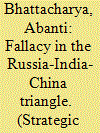

|
|
|
|
|
| Publication |
Apr-Jun 2004.
|
|
|
|
|
|
|
|
|
|
|
|
|
|
|
|
| 13 |
ID:
086231
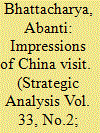

|
|
|
|
|
| Publication |
2009.
|
| Summary/Abstract |
A China team from the Institute for Defence Studies and Analyses (IDSA) had visited Beijing and Shanghai between September 21 and 27, 2008 and held several rounds of dialogue with the five think-tanks of China.1 Three major issues that came up repeatedly during the discussions were: (1) what India's interests are in East Asia; (2) what role the United States has in Asia; and (3) what perception China has towards South Asia in general and Pakistan in particular. In other words, China's broad security concerns seem to emanate from issues of evolving security architecture in Asia, changing dynamics of the US-China relations, and emerging South Asia policy. These concerns are, in fact, tied to the central crux of its foreign policy - that of China's emergence as a world power.
|
|
|
|
|
|
|
|
|
|
|
|
|
|
|
|
| 14 |
ID:
082537
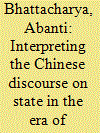

|
|
|
|
|
| Publication |
2008.
|
| Summary/Abstract |
Under the impact of globalization the Chinese state is caught in the dilemma of intensifying economic reforms on the one hand, and maintaining authoritarian rule on the other. This dichotomy has put China at the crossroads and precipitated a debate between its Left and the Right groups on the direction the Chinese state should take. Hu Jintao sought to address this dilemma by formulating the concept of harmonious development. However, there are doubts on how an authoritarian China will reconcile with the two opposing forces of globalization and authoritarianism and thereby achieve a truly harmonious society
|
|
|
|
|
|
|
|
|
|
|
|
|
|
|
|
| 15 |
ID:
075149
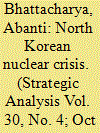

|
|
|
| 16 |
ID:
099150
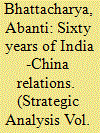

|
|
|